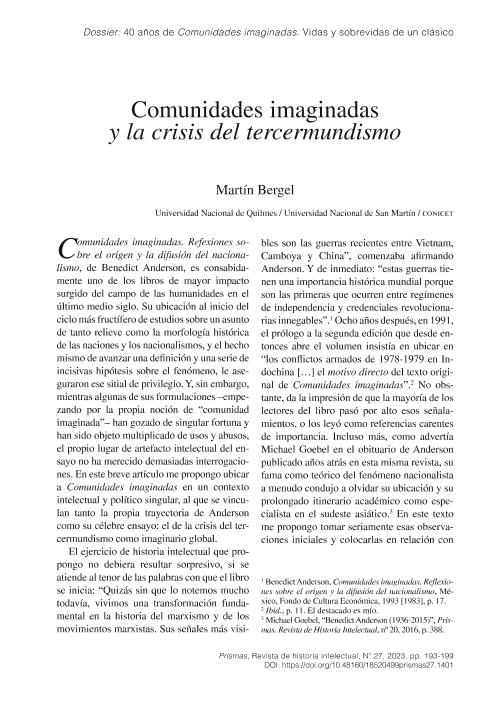Mostrar el registro sencillo del ítem
dc.contributor.author
Bergel, Martin

dc.date.available
2023-12-27T19:11:35Z
dc.date.issued
2023-12
dc.identifier.citation
Bergel, Martin; Comunidades Imaginadas y la crisis del tercermundismo; Universidad Nacional de Quilmes; Prismas; 27; 2; 12-2023; 193-199
dc.identifier.issn
1666-1508
dc.identifier.uri
http://hdl.handle.net/11336/221682
dc.description.abstract
Comunidades imaginadas. Refexiones sobre el origen y la difusión del nacionalismo, de Benedict Anderson, es consabidamente uno de los libros de mayor impacto surgido del campo de las humanidades en el último medio siglo. Su ubicación al inicio del ciclo más fructífero de estudios sobre un asunto de tanto relieve como la morfología histórica de las naciones y los nacionalismos, y el hecho mismo de avanzar una definición y una serie de incisivas hipótesis sobre el fenómeno, le aseguraron ese sitial de privilegio. Y, sin embargo, mientras algunas de sus formulaciones –empezando por la propia noción de “comunidad imaginada”– han gozado de singular fortuna y han sido objeto multiplicado de usos y abusos, el propio lugar de artefacto intelectual del ensayo no ha merecido demasiadas interrogaciones. En este breve artículo me propongo ubicar a Comunidades imaginadas en un contexto intelectual y político singular, al que se vinculan tanto la propia trayectoria de Anderson como su célebre ensayo: el de la crisis del tercermundismo como imaginario global.
dc.description.abstract
The article proposes an intellectual history approach to Imagined Communities, placing the book in a specific political-intellectual context: that of the crisis of Third World imaginaries at the end of the 1970s. To this end, the article uses the references provided by the book itself, starting with Anderson’s opening remarks on the significance of the international wars between Southeast Asian countries in that period, in combination with traces of his own autobiography and with the field of recent research on the history of Third Worldism. The argument of the article is that through Anderson’s trajectory, and in particular in Imagined Communities, it is possible to read the crisis of the Third World utopia (unders-tood as a field of articulation between internationalism and popular nationalisms).
dc.format
application/pdf
dc.language.iso
spa
dc.publisher
Universidad Nacional de Quilmes

dc.rights
info:eu-repo/semantics/openAccess
dc.rights.uri
https://creativecommons.org/licenses/by-nc-sa/2.5/ar/
dc.subject
Benedict Anderson
dc.subject
Comunidades Imaginadas
dc.subject
Nacionalismos
dc.subject
Tercermundismos
dc.subject.classification
Otras Humanidades

dc.subject.classification
Otras Humanidades

dc.subject.classification
HUMANIDADES

dc.title
Comunidades Imaginadas y la crisis del tercermundismo
dc.title
Imagined Communities and the Crisis of Third Worldism
dc.type
info:eu-repo/semantics/article
dc.type
info:ar-repo/semantics/artículo
dc.type
info:eu-repo/semantics/publishedVersion
dc.date.updated
2023-12-26T13:50:48Z
dc.identifier.eissn
1852-0499
dc.journal.volume
27
dc.journal.number
2
dc.journal.pagination
193-199
dc.journal.pais
Argentina

dc.journal.ciudad
Quilmes
dc.description.fil
Fil: Bergel, Martin. Consejo Nacional de Investigaciones Científicas y Técnicas; Argentina. Universidad Nacional de Quilmes. Departamento de Ciencias Sociales. Centro de Historia Intelectual; Argentina
dc.journal.title
Prismas
dc.relation.alternativeid
info:eu-repo/semantics/altIdentifier/url/https://prismas.unq.edu.ar/OJS/index.php/Prismas/article/view/1401
dc.relation.alternativeid
info:eu-repo/semantics/altIdentifier/doi/https://doi.org/10.48160/18520499prismas27.1401
Archivos asociados
